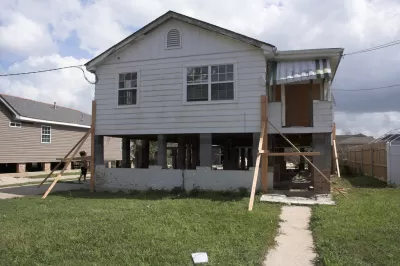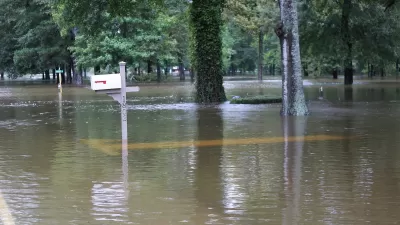After a series of hurricanes, experts discuss how guide people out of the way of the most deadly floods and storms.

"As seas rise, flooding is becoming almost a weekly occurrence in cities up and down the East Coast. As storms grow stronger, so are the calls to walk away from the most flood-prone places," Miyuki Hino, Katharine J. Mach, and Christopher B. Field write in Vox.
The problem is not that there aren't good reasons to move. "We found that moving to safer ground can be an attractive option for many reasons: It protects livelihoods, restores coastal ecosystems, and reduces damages from extreme weather," they write. But existing incentives can push people to stay.
Property taxes support localities, motivating mayors to keep populations in place or grow them. In states like Florida and Texas, which lack a state income tax, this incentive gets even stronger.
Monetary concerns can contribute to states decisions to let developers build freely. Meanwhile, when these places flood, relief efforts call heavily on federal money. "Florida alone is home to 1,601 'severe repetitive loss properties' — properties that, on average, flood every two to three years and have been rebuilt five times with the help of taxpayer money. Harris County, Texas, which includes Houston, has close to 2,000 such properties."
FULL STORY: Abandon Florida? Not quite. But it’s time for a retreat from flood zones.

Planetizen Federal Action Tracker
A weekly monitor of how Trump’s orders and actions are impacting planners and planning in America.

San Francisco's School District Spent $105M To Build Affordable Housing for Teachers — And That's Just the Beginning
SFUSD joins a growing list of school districts using their land holdings to address housing affordability challenges faced by their own employees.

The Tiny, Adorable $7,000 Car Turning Japan Onto EVs
The single seat Mibot charges from a regular plug as quickly as an iPad, and is about half the price of an average EV.

Seattle's Plan for Adopting Driverless Cars
Equity, safety, accessibility and affordability are front of mind as the city prepares for robotaxis and other autonomous vehicles.

As Trump Phases Out FEMA, Is It Time to Flee the Floodplains?
With less federal funding available for disaster relief efforts, the need to relocate at-risk communities is more urgent than ever.

With Protected Lanes, 460% More People Commute by Bike
For those needing more ammo, more data proving what we already knew is here.
Urban Design for Planners 1: Software Tools
This six-course series explores essential urban design concepts using open source software and equips planners with the tools they need to participate fully in the urban design process.
Planning for Universal Design
Learn the tools for implementing Universal Design in planning regulations.
Smith Gee Studio
City of Charlotte
City of Camden Redevelopment Agency
City of Astoria
Transportation Research & Education Center (TREC) at Portland State University
US High Speed Rail Association
City of Camden Redevelopment Agency
Municipality of Princeton (NJ)





























